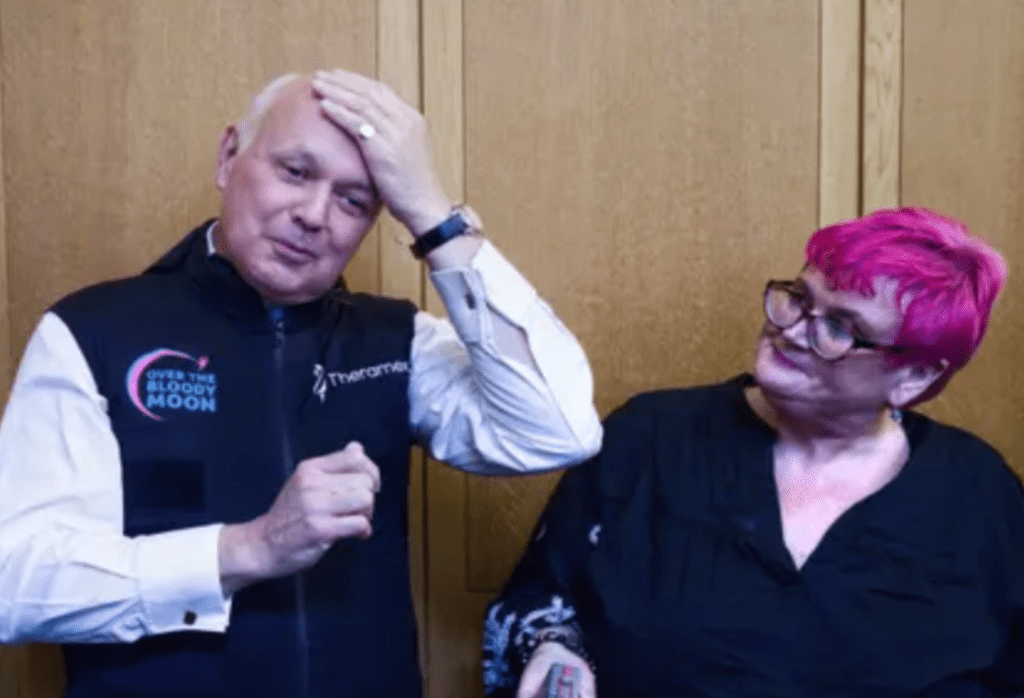Male MPs in the UK have experienced what it’s like to go through menopause after wearing vests that simulated the feeling of a hot flush — one of the most common symptoms of menopause, which impacts around 5.1 million women in the UK.
MPs including former Tory leader Iain Duncan Smith and Shadow Health Secretary Wes Streeting, participated in a menopause awareness campaign that aimed to highlight the country’s lack of of hormone replacement therapy (HRT) products.
Organised by Labour MP Carolyn Harris, co-chair of the Department of Work and Pension’s Menopause Taskforce, and the menopause support provider Over the Bloody Moon, several male MPs tested the special vest, which was equipped with electric heated pads that imitate the sensation of hot flushes.
Shadow Health Secretary Wes Streeting described the sensation of trying on the vest as “deeply unpleasant.”
“[There was] an enveloping heat,” he said. “How you would crack on with life I don’t know. I can’t wait to take this off.”
“Women are having to go private. For something that is so common like menopause, it is outrageous.”
Shadow Minister for Immigration, Stephen Kinnock, said wearing the vest felt like “a very intense kind of heat and an internal feeling, not like being warmed by the sun, but almost volcanic inside.”
Former Tory leader Iain Duncan Smith had only worn the vest for a few seconds before he made the comment, “I’m feeling this on my back now.”
“Imagine making a speech in the House of Commons and suddenly getting a hot flush,” he said. “If [men] had this, we’d be complaining a lot.”
Harris joked, “If you pass out, we’ve got water.” The 61-year old Labour MP for Swansea East sponsored the event at Portcullis House in Westminster, and added “Welcome to my world. I don’t need the vest to be hot and bothered.”
“We need air conditioning, we need ventilation, fresh air, cold water,” she told BBC. “They’re not massive things but they’re enough to make a difference between surviving the day and actually getting through the day.”
Harris has been outspoken about her experience of menopause for many years. Last October, ahead of her private member’s bill concerning menopause, she led a group of supporters to Parliament Square in London to demand free prescriptions for hormone replacement therapy in England.
“It took me six years, having conversations with women, for me to realise I was going through menopause,” she said last year.
“There’s a hell of a lot of women my age, working in supermarkets in shops and they are exhausted. A lot of those women are going through menopause but they are not being treated, because in 2021 there is still not enough understanding about a condition that affects 51 per cent of the population.”
This week, she told reporters it was “easy to underestimate” the severity of hot flushes and the impact they have on a woman’s daily life. In fact, in the UK, menopausal symptoms contribute to one in 10 women leaving their jobs.
Harris hoped the menopause-simulating vests may help men empathise with the experience.
The vest was created by Over the Bloody Moon, an organisation offering advice on menopause to the public, and funded by women’s health company, Theramex, one of the biggest developers of HRT product in the UK.
Lesley Salem, founder of Over the Bloody Moon, told The Guardian, “Hot flushes are one of top three symptoms that impact on the lives of menopausal women – disrupting sleep, increasing levels of anxiety and often affecting women’s performance at work.”
In the past few months, the UK has seen a spike in demand for HRT drugs, causing widespread shortage of available products.
This has left many women sleepless and unable to work productively. Some women have resorted to trading HRT drugs in public carparks, or procuring them online at hugely inflated prices.
In February 2020 alone, roughly 324,000 prescriptions were issued for HRT. By comparison, in the month of February this year, around 512,000 prescriptions for HRT were issued. In countries such as Scotland and Wales, prescriptions for hormone replacement therapy are already available for free.
This week, a collective of prestigious medical charities, including British Menopause Society and Royal College of Obstetricians and Gynaecologists, created a list of 11 new ‘practice standards’ for menopause care.
The standards include ‘holistic and individual’ support for women on their treatment options, advice on how to change their diets, quit smoking, reduce alcohol consumption, as well as information on HRT and other hormonal drugs.


